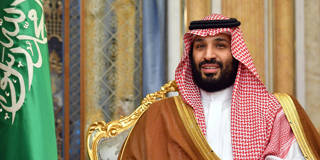Saudi Crown Prince Mohammed bin Salman is leading a major economic and political transformation, with the goal of turning his country from a rentier petrostate into a major geopolitical force with a diversified economy. The Kingdom's ambitious domestic reforms and foreign-policy agenda thus are inextricably linked.
RIYADH – Saudi Arabia is undergoing a nationalist transformation. During this year’s Saudi National Day, on September 23, people across the Kingdom – especially the young people who constitute a majority of the population – turned out in droves to wave flags, dance, and marvel at military flyovers. Promoted by Saudi Arabia’s de facto leader, Crown Prince Mohammed bin Salman (widely known as MBS), the surge in patriotic displays sheds light on the motivations behind the country’s recent political and economic reforms.
Begin with the foreign-policy front, where Saudi Arabia has agreed to a détente with Iran, facilitated by China; entered into talks with Israel, brokered by the United States, to normalize the diplomatic relationship; gained entry into the BRICS group of major emerging economies; and embarked on efforts to end the war in Yemen.
Domestically, the Kingdom has pursued a major transition that includes centralization and consolidation of power under MBS; suppression of dissent, especially from Islamists advocating an alternative political model; and a revision of Saudi history and school curricula to align with the regime’s narratives. Meanwhile, the Kingdom has made massive investments in international sports (particularly golf and soccer) and adopted an oil-production policy more aligned with its long-term fiscal needs.

RIYADH – Saudi Arabia is undergoing a nationalist transformation. During this year’s Saudi National Day, on September 23, people across the Kingdom – especially the young people who constitute a majority of the population – turned out in droves to wave flags, dance, and marvel at military flyovers. Promoted by Saudi Arabia’s de facto leader, Crown Prince Mohammed bin Salman (widely known as MBS), the surge in patriotic displays sheds light on the motivations behind the country’s recent political and economic reforms.
Begin with the foreign-policy front, where Saudi Arabia has agreed to a détente with Iran, facilitated by China; entered into talks with Israel, brokered by the United States, to normalize the diplomatic relationship; gained entry into the BRICS group of major emerging economies; and embarked on efforts to end the war in Yemen.
Domestically, the Kingdom has pursued a major transition that includes centralization and consolidation of power under MBS; suppression of dissent, especially from Islamists advocating an alternative political model; and a revision of Saudi history and school curricula to align with the regime’s narratives. Meanwhile, the Kingdom has made massive investments in international sports (particularly golf and soccer) and adopted an oil-production policy more aligned with its long-term fiscal needs.